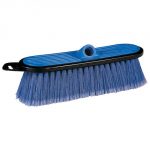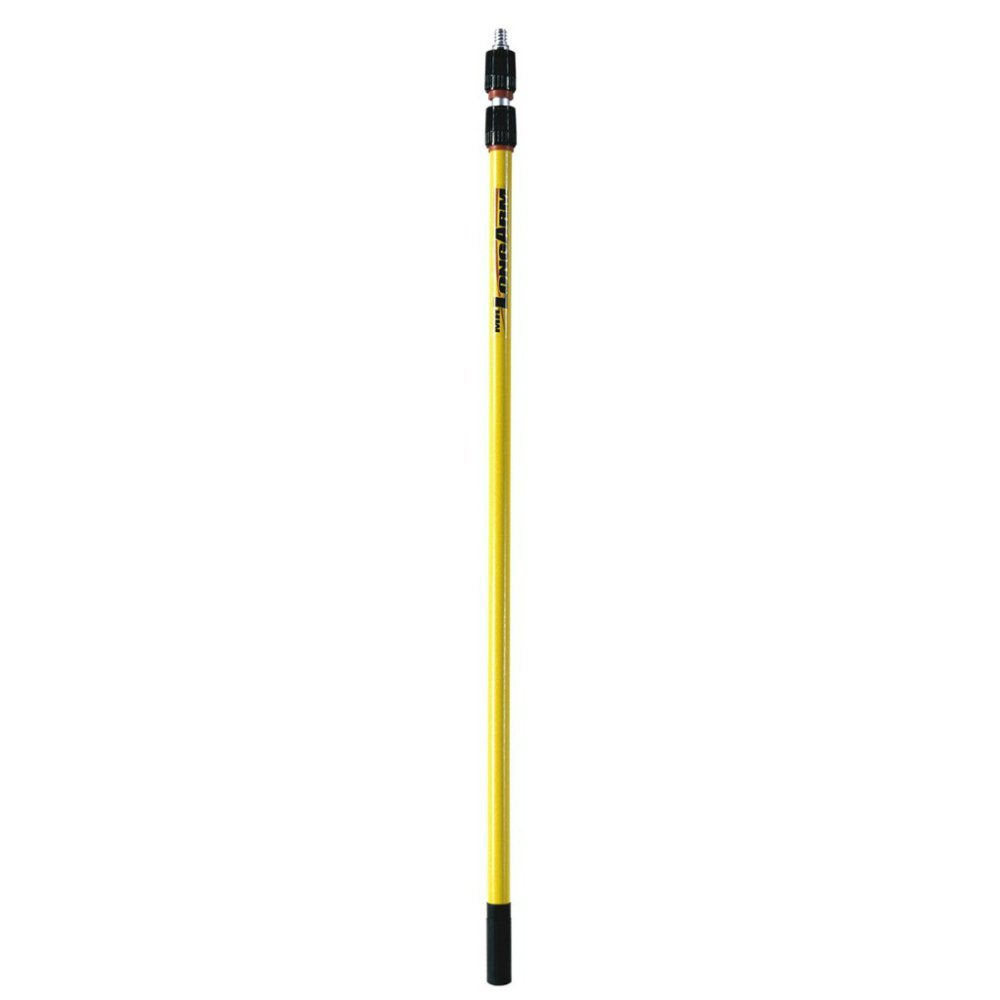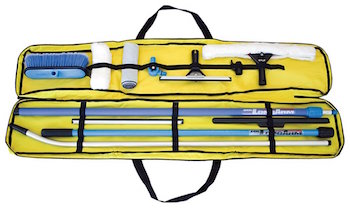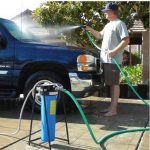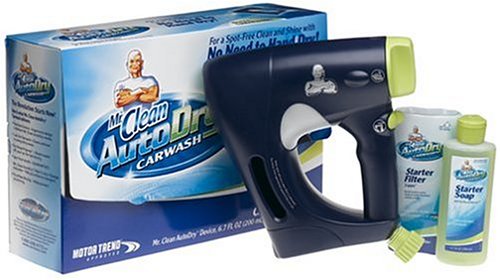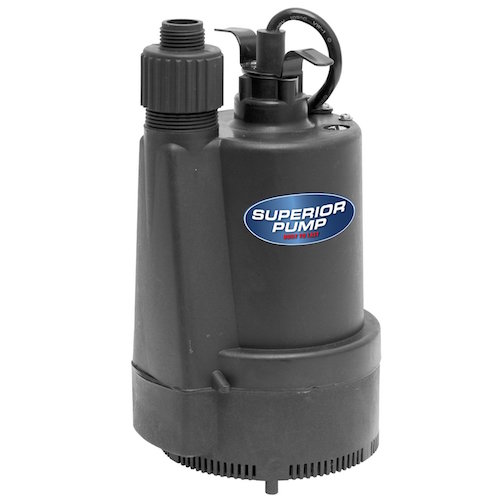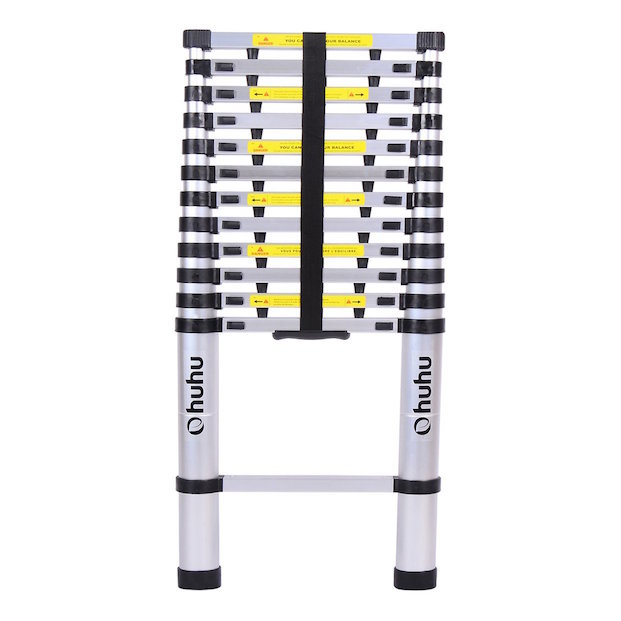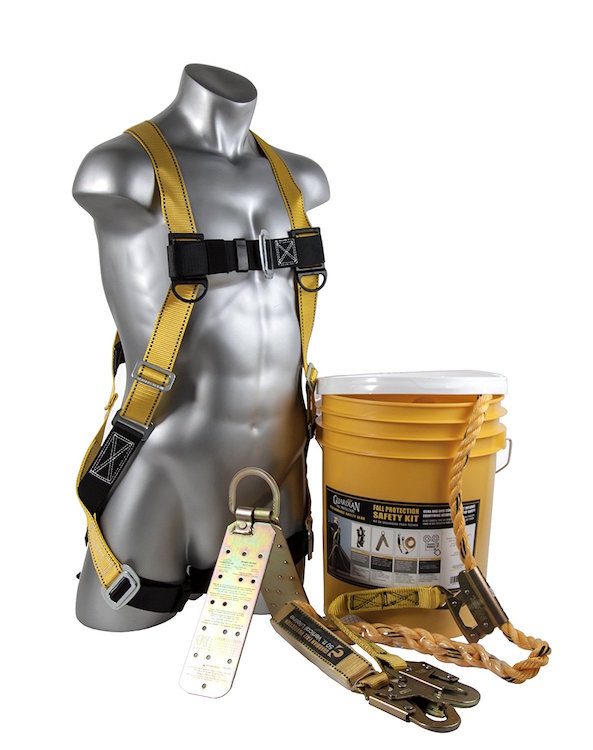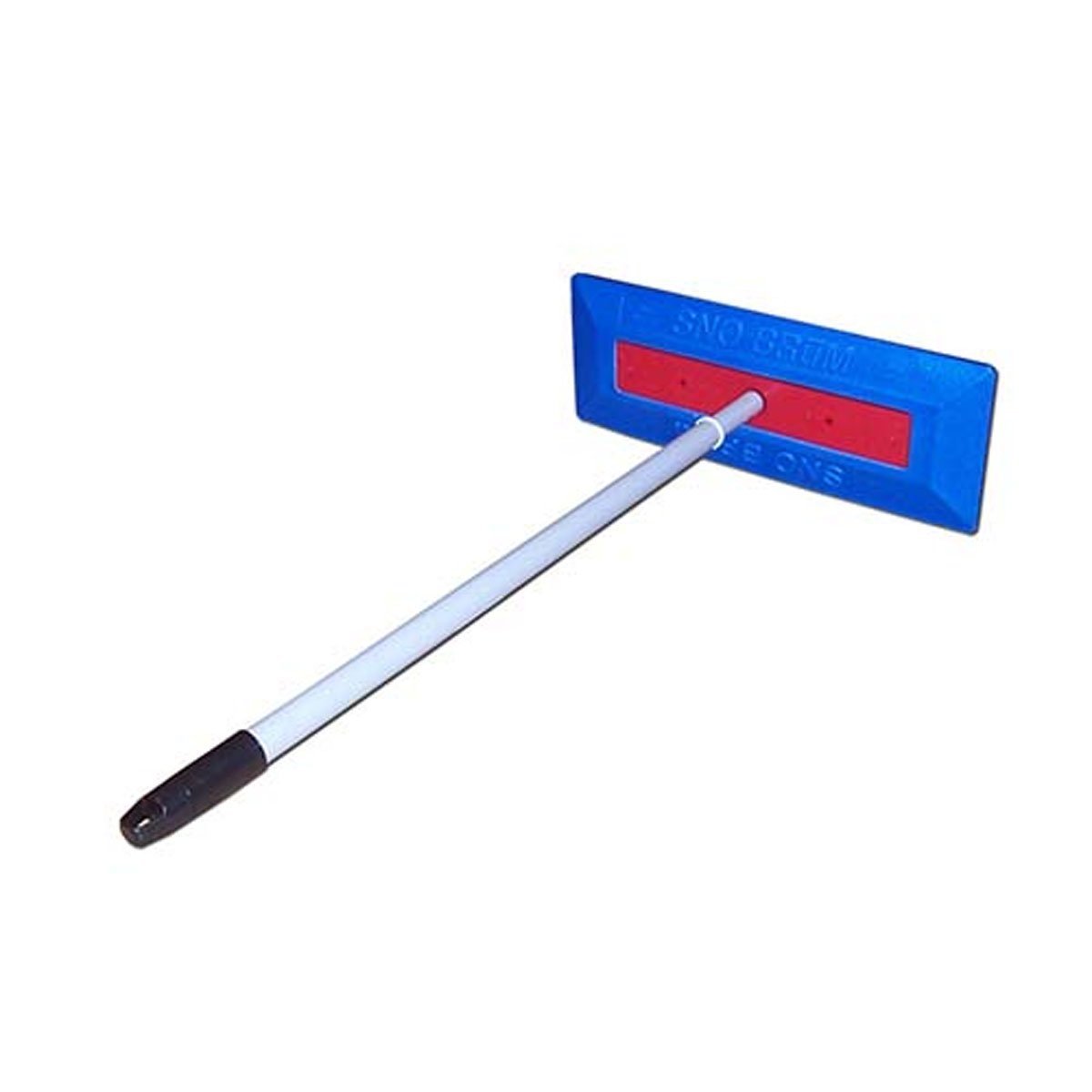Best Solar Panel Cleaning Tools
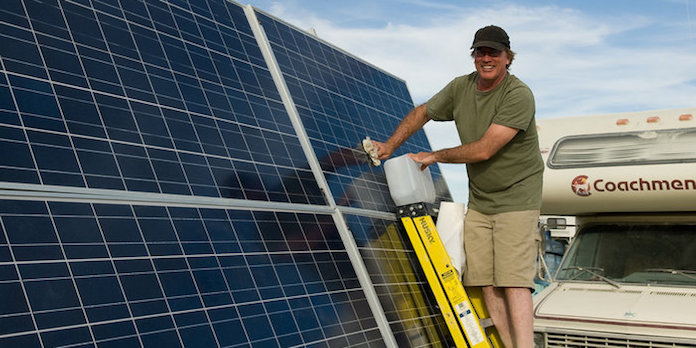
If it’s time to spruce up your solar panels, let’s first look at the best solar panel cleaning tools.
You probably remember the moment that your shiny new solar panels arrived at your home and were installed on your roof. Just like we marvel at brand new TVs with no fingerprints or smudges fouling the picture, pristine solar panels can be quite impressive. But just like that TV, solar panels will start to accumulate dust and dirt on the surface very quickly, and that is when you have to consider the best solar panel cleaning tools for the job of keeping them clean and working efficiently.
Pollen, dust in the air, smog, bird droppings, leaves and more can all find their way to your panels and start to create problems. Because you probably didn’t rush out to buy solar panel cleaning tools on the first day of your installation, now is the time to consider getting the right tools for that cleaning job. Below we have covered some of the types of cleaning tools that you may want to consider, including some of our top picks for the best solar panel cleaning tools for 2018.
How big of a problem is dirt and dust on solar panels?
It varies from place to place, but some studies have shown that dust storms can decrease the power output of a solar array by 20-50%. The high end of that spectrum would be reserved for areas with frequent dust storms and very little rainfall to help clean the panels naturally, but the reality is that there will be some loss of power whenever something is getting in between the sun and the solar cell. Although we’ve already talked a bit about how to clean your solar panels, today we’re going to dive in and look more closely at the solar panel cleaning tools and why they are important.
Types of Solar Panel Cleaning Tools
Before we get into the nitty-gritty, remember that everyone’s situation is going to be a bit different from the next one. Some people have rooftop installations; some have ground. Some roofs are easily accessible from the ground, and others aren’t. All of these factors must be taken into consideration while you are planning your cleaning strategy.
Another important aspect to consider is safety. If you have a rooftop installation, it is imperative that you are comfortable working in that environment before you proceed. Because of the potential danger involved, it would be best to consider options that allow you to clean from the ground first and avoid walking on the roof altogether! Remember, when in doubt consult with professionals (and please understand this information is provided for informational value only, and is not intended to be taken as advice).
One more thing! It should be noted that although cleaning the panels should help with your solar system performance, the amount involved will probably not be worth a hugely expensive investment in cleaning supplies nor hiring a professional cleaner to do the job. Try to get the exact items you need for your unique situation and take a few notes about the before and after gains. Do the math to see what kind of financial sense cleaning makes and also to see how often it would be worthwhile to clean them.
Best Solar Panel Cleaning Tools
And now on to some of the equipment that you may need to have on hand when cleaning your solar panels, and some of our picks for the best solar panel cleaning tools to buy…
Brushes and Poles
Brushes and poles are going to be your bread and butter solar panel cleaning tools. They will allow you to reach up onto the roof from the ground and maintain a high level of safety. For cleaning solar panels, you want to find a quality brush head that has two important features:
- Soft bristles – Although solar panels are quite durable, you’ll want to avoid any abrasive material so that performance-robbing scratches don’t become a factor.
- Flow-through design – Having a brush head that allows water to flow through the head works perfectly in this situation. This flow will enable you to spray down the panels quickly, add soap to the water source, and rinse down the panels after cleaning.
Mr. LongArm Soft Flow-Thru Brush
As far as specific items go, there are options to suit any needs and budgets. For individual parts, Mr. LongArm is well reviewed and can easily be found at online retailers.
Mr. LongArm 6 to 18-feet Alumi Glass Extension Pole
Also available, is their extension pole.
Mr. LongArm Pro Curve Solar Panel Cleaning System Kit
Assuming you have a quality garden hose and a good water supply, you could get started pretty quickly for under $100 and have the basics covered. For those of you that like a complete kit package, the same company offers a whole setup meant specifically for solar panel cleaning for under $300.
This kit will include the above items plus a squeegee, drying head, additional adapters, and different pole options. This kit should serve you well for quite a while.
Water Purification Equipment
If you live in an area with very hard water, then mineral deposits left on your solar panels as they dry could be a real issue. It could be a little demoralizing to spend an hour cleaning your panels only to discover later that they look even dirtier than they were when you started! This happens because those minerals, mostly calcium, will not evaporate with your rinse water and instead will dry into a scale on the surface of your solar panels.
The good news is that if you have soft water, then you shouldn’t need to worry too much about this step but use your own situation to help determine your needs. If you do decide that you need some extra filtering then purchasing a standalone filter might be useful.
DI-120 Cr Spotless Water System
This system allows you to run hose water through the filter and spray deionized water out the other end with pressure.
As a side benefit, you can also wash your car with this and your car will certainly thank you if you use this system in the final rinse. Those same deposits can form on the car’s paint and lead to a cloudy finish!
Mr. Clean AutoDry Car Wash System Starter Kit
Speaking of cars, depending on your situation you might be able to get away with using a smaller setup like this car wash system.
Water Pumps
As an alternative to purchasing a deionizing system, you might want to consider using rainwater or another water source with naturally softer water. If you already use catch basins to collect rain water, purchasing a small pump to attach to your flow-through brush head might work well for your needs.
Superior Pump 1/4 HP Submersible Utility Pump
You won’t need a huge pump to get the job done because we aren’t relying on the pressure to clean the panels, but rather the scrubbing action.
These little guys come in handy in many other projects as well so it’s highly possible that you’ll get more out of this purchase than simply an addition to your solar panel cleaning tools.
Ladders
If you choose to manage your cleaning project from the roof, or circumstances make cleaning from the ground impossible, then safety equipment must be considered a requirement.
Depending on the height of your home, there are multiple options for finding a ladder that will do the job.
Ohuhu 12.5ft Aluminum Telescopic Extension Ladder
For a standard one-story rooftop, this 12.5-foot ladder should provide a more convenient, economical option.
Louisville Ladder Pro Top Fiberglass Extension Ladder 28-foot
For two-story homes, you’ll need a bit more ladder to get the job done:
Remember to use your unique situation to determine what you need. If you do not currently own a ladder and want to make sure that you get something that will work well for your project, use Home Depot’s handy ladder measurement graphic to be sure that you are working safe and purchasing the most economical option.
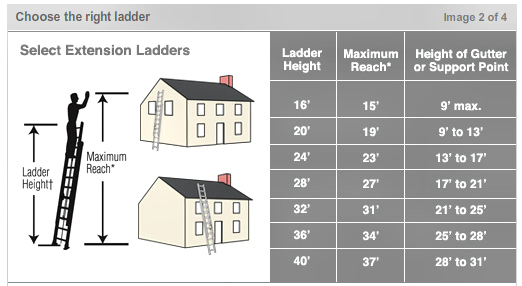
Other Safety Equipment
Working on the roof means that there will always be a danger of falling. Be sure to suit up in a safety harness to ensure that your first slip won’t be your last! Safety harnesses can be found for surprisingly low prices and manufacturers such as Guardian Fall Protection offer all-in-one systems that include everything from the harness to a bucket to store the kit in.
Guardian Fall Protection Bucket of Safe-Tie with Temper Anchor
This particular kit also meets or exceeds all OSHA and ANSI standards for safety and comes highly reviewed. There is no excuse for not taking your safety seriously!
Managing Snow Accumulation
We’ve talked about how to remove snow before, but getting rid of snow certainly qualifies as a project that would require some solar panel cleaning tools! Along with brushes and tennis balls, snow rakes can make short work of the accumulated snow intent on robbing you of your electricity production!
Before you go purchasing the first snow rake you see, remember that most of these rakes were designed to be used on rooftops, not solar panels. As such, they can be made from metal or even hard plastic that could scratch or break the glass on your panels if you aren’t careful. Finding a model with some padding is essential.
SnoBrum Original Snow Removal Tool
The SnoBrum (Snow Broom) has a 27″ to 46″ telescoping handling and features a durable foam head to prevent those scratches.
If the snow accumulation is severe, be sure to exercise care so that you don’t create a mini avalanche on top of yourself!
Conclusion
Hopefully, you’ve learned a little bit about what it could take to keep your solar panels in tip-top shape by looking at some excellent solar panel cleaning tools. Don’t forget that your unique situation will govern how little, or how much, that you will need to purchase to clean your panels. Find out what the best solar panel cleaning tools are for your needs first so that you don’t go whole-hog without considering what it is you really need.
How do you clean your solar panels? What are your top picks for the best solar panel cleaning tools? What has your experience been in the past? Are there any tools that you wished you had from the beginning or something that you find yourself never using? Let us know in the comments!
Image Credit under CC License from Flickr

